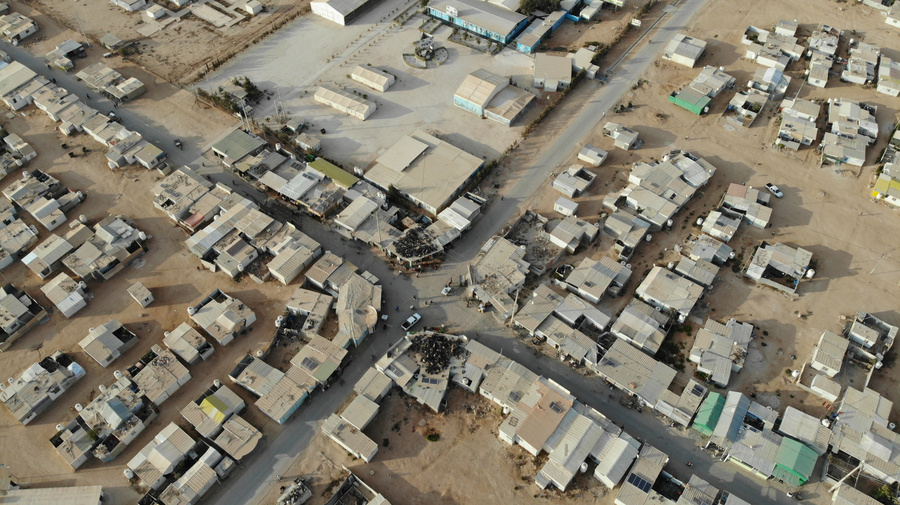1 per cent of humanity displaced: UNHCR Global Trends report
1 per cent of humanity displaced: UNHCR Global Trends report

Drone image of Zaatari Refugee Camp
UNHCR, the UN Refugee Agency is today appealing to countries worldwide to do far more to find homes for millions of refugees and others displaced by conflict and persecution. This is as its annual Global Trends report released today shows that forced displacement is now affecting more than one percent of humanity – 1 in every 97 people – and with fewer and fewer of those who flee being able to return home.
UNHCR Global Trends, which is released two days ahead of 20 June World Refugee Day, shows that an unprecedented 79.5 million were displaced as of the end of 2019. UNHCR has not seen a higher total. Jordan currently hosts just under 750,000 refugees, amounting to the second highest number of refugees per capita globally.
The report also notes diminishing prospects for refugees when it comes to hopes of any quick end to their plight. In the 1990s, on average 1.5 million refugees were able to return home each year. Over the past decade that number has fallen to around 390,000, meaning that growth in displacement is today far outstripping solutions.
As the Syria conflict, accounting for 13.2 million refugees, asylum seekers, and internally displaced people, a sixth of the world’s total, has entered its tenth year, the majority of refugees in Jordan continue to face the long-term prospect of living outside their country. While the Jordanian Government and people have continued to demonstrate generosity and hospitality towards hosting refugees, durable solutions are increasingly needed.
“We are witnessing a changed reality in that forced displacement nowadays is not only vastly more widespread but is simply no longer a short-term and temporary phenomenon,” said UN High Commissioner for Refugees Filippo Grandi. “People cannot be expected to live in a state of upheaval for years on end, without a chance of going home, nor a hope of building a future where they are. We need a fundamentally new and more accepting attitude towards all who flee, coupled with a much more determined drive to unlock conflicts that go on for years and that are at the root of such immense suffering.”
In addition, refugees across Jordan are increasingly finding themselves living in poverty especially as a result of the recent coronavirus crisis. Before the pandemic hit, 79% of refugees in Jordan were already living below the poverty line but recent surveys indicate that this proportion has now increased. Only 35% of refugees in Jordan said that they had a job to return to as curfews put in place to respond to the COVID 19 pandemic have started to lift.
“The coronavirus crisis has affected all our lives, refugees and Jordanians alike, and will continue to have a long-term impact for many months to come,” said UNHCR Jordan Representative, Dominik Bartsch. “Combined with the startling statistics released in today’s Global Trends report it is clear there has to be a collective effort in addressing the needs of refugees, both international and national communities have an important role to play,” he concluded.
Additional facts and stats about forced displacement:
- 100 million people at least were forced to flee their homes in the past decade, seeking refugee either in or outside their countries. That’s more people fleeing than the entire population of Egypt, the world’s 14th most populous country.
- Forced displacement has almost doubled since 2010 (41 million then vs 79.5 million now).
- 80 percent of the world’s displaced people are in countries or territories affected by acute water scarcity, food insecurity and malnutrition – many of them countries facing climate and natural disaster risk.
- More than three-quarters of the world’s refugees (77 percent) are caught up in situations of long-term displacement – for example the situation in Afghanistan, now in its fifth decade.
- More than eight of every 10 refugees (85 percent) are in developing countries, generally a country neighbouring the one they fled.
- Five countries account for two-thirds of people displaced across borders: Syria, Venezuela, Afghanistan, South Sudan and Myanmar.
- Global Trends Report counts all major displaced and refugee populations, including the 5.6 million Palestine refugees who fall under the care of the United Nations Relief and Works agency for Palestine.
- Displacement in cities and towns has become widespread. Among internally displaced populations two thirds live in urban or semi-urban areas as of 2019, according to available data. In Jordan, 83% of refugees live in urban areas.
- The 2030 Sustainable Development commitment of “leaving no one behind” now explicitly includes refugees, thanks to a new indicator on refugees approved by the UN Statistical Commission in March this year.
****
NOTE: UNHCR’s Global Trends report is released in parallel with its annual Global Report , which reports on actions UNHCR is taking to address the needs of all who are forced to flee, as well as the world’s known stateless populations.
For more information please contact
EN Lilly Carlisle, UNHCR Jordan, +962, 799649430, [email protected]
AR Mohammad Hawari, UNHCR Jordan, +962 79 895 6781, [email protected]

